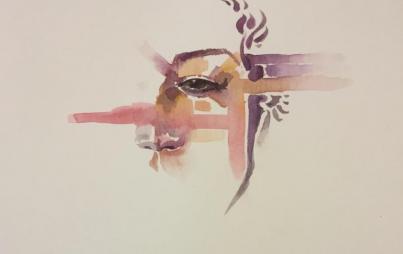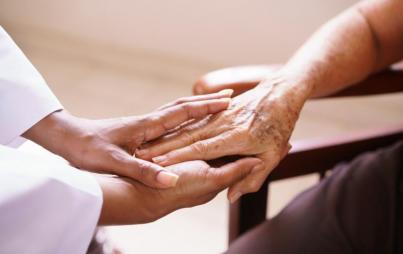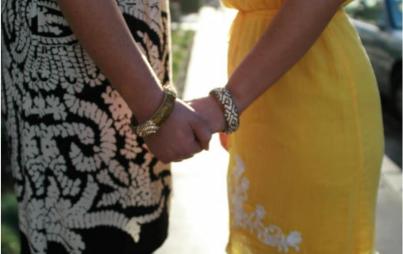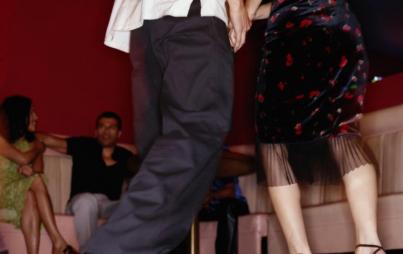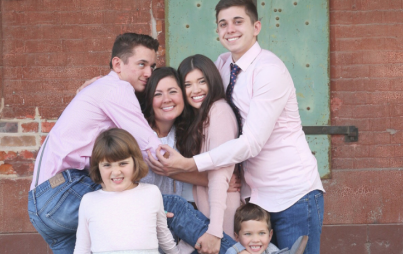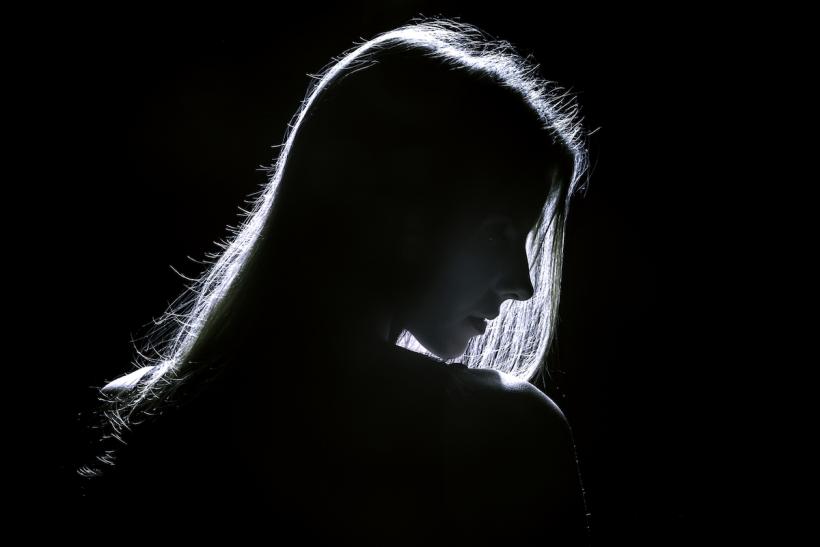
Did my mom feel alone, as if she were blamed for what happened to her? Like nobody could understand what she was dealing with?
Long Reads is a bimonthly feature, showcasing long-form essays.
CN: rape; drinking
Legend has it that on an early date, my mom was drinking Southern Comfort whiskey from the bottle. My dad made a passing joke that she wasn’t classy, and — being the stubborn person she was — my mom said she was getting out of his car.
“Fine, I’ll leave you here!” my dad said.
My mom got out onto the sidewalk, and my dad — being the stubborn person he is — drove away.
He never said that she wasn’t classy again.
--
When my mom died, I made a list of things that made me similar to her: My favorite color was purple, I liked to write, I loved reading, I adored cats, I didn’t wear makeup, my favorite soda was Pepsi, I lived in oversized sweaters. I was 11, so I didn’t add “I love to drink” to the list, but it crosses my mind now whenever I’m at a bar with friends, and I decide to order a cocktail.
If I re-wrote the list now, would I put “loves to drink” as one of the things my mom and I have in common? Did I inherit my love of drinking from her the way I inherited my physical disability, which causes poor balance, difficulty walking, and an inability to tolerate the cold? Is it as much a part of where I come from as my love of cats, or my affinity for pizza?
Being raised by (mostly) recovering alcoholics, my relationship to booze has historically been complicated. When I was a kid, I heard words like “sober” and “addiction.” I think I was 11 or 12 the first time I got the talk — not the sex talk, the drugs and alcohol talk. The “addiction is in your genes; please be careful” talk. Most of my friends’ parents had glasses of wine or martinis after a long day at work. Mine taught me that you need to carefully consider why you’re consuming alcohol every single time you do, lest it becomes an unhealthy coping mechanism.
--
While my mom had mostly been in recovery, she’d struggled. There were nights when she would drink Jack Daniels on the rocks with my Italian grandfather, and I’d listen to him tell her stories about his days in the Marines from the top of our staircase, the sound of their laughter carrying up through the walls. My dad was sober when I was young, without even a blip — he had the AA coins on his nightstand to prove it. My mom’s rule was moderation; my dad’s was abstinence.
I was 13 when I had my first drink, a beer at my cousin’s graduation party.
I was in unrequited love with my straight best friend, and the college kids playing beach volleyball were all downing beers like it was their post-grad career. They looked happy as they smacked the ball over the net (like I imagined all adults were, which was how I wanted to feel).
It was the first time I’d ever had an emotion that I couldn’t handle. Even though I’d survived the loss of my mom, I didn’t know how I would survive this. Would I lose my best friend? Could she and I ever be close again? I chugged two beers while no one was looking and rejoined the party, where my straight best friend was waiting for me to act like everything was okay. Later that night, I went to bed sad and woke up in the morning vomiting. Whether I was truly hungover or simply unlucky, I’m still not sure.
After the experience, I swore off alcohol permanently. When you grow up in a family of alcoholics, some recovered and others not, you think of alcohol as a poison and an inherent evil from the start.
--
I was 20, it was New Year’s Eve, and I had a half dozen of my closest friends over. We were drinking and staying in, making cocktails and taking shots. I’d long ago lost count of how many I’d had. One of my friends’ faces was bright red like she was permanently blushing, and another had to keep retaking photos because she would blink in every one.
As I headed into the kitchen to down another shot, I passed my dad, who was making sure we were all safe, nobody was driving, and everyone was staying in their limits.
“How many shots have you had?” one of my friends asked me from another room.
I pumped my fist into the air with gusto. “Not enough!”
My dad laughed as I walked by him to get to the kitchen. “You’re just like your mom,” he said. “Like an Irish stereotype. Wooden leg.”
I didn’t think about it at the time, but I’ve thought about it many times since then. If I re-wrote the list now, would I put “loves to drink” as one of the things my mom and I have in common? Did I inherit my love of drinking from her the way I inherited my physical disability, which causes poor balance, difficulty walking, and an inability to tolerate the cold? Is it as much a part of where I come from as my love of cats, or my affinity for pizza?
--
My mom and I weren’t alike in every way. When she was alive, that was perfectly fine with me. She lived in oversized sweaters — even the kind that featured goofy patterns of cats, like something a grandmother would gift you at the holidays, but I enjoyed dressing up and wearing skirts. She wore clogs almost every day and loved her jean jacket, and I’m strictly a flats kind of person. She had to have at least one cup of coffee in the morning before she was really human, and I drink it rarely and only in a form that barely resembles actual coffee. She had a college degree in biology, with an original intent of studying marine biology, and I got mine in professional writing.
Once she was gone, I wanted to be exactly like her.
She wasn’t around to be herself, and I felt like I had to pick up that duty in her place. The things we had in common fell into place and felt so natural, but I struggled with our differences. Unlike my mom, I’m queer, and I’m in a committed relationship with a woman. When I was first coming out, this killed me: Not just because it made me different from who she was, but because it was something I’d never get to share with her. I loved our differences because they were something we could share — she’d listen to me tell my early fiction stories, and I was happy to watch Seinfeld with her even though it wasn’t my sense of humor.
I had barely started drinking — only occasionally, for about a year — at the time I was raped at a college party as a freshman. This instantly connected me to my mom, who was also a survivor. Although she wasn’t around to talk about it with, I could almost feel her in my late night binge drinking sprees that lasted until the 5 a.m. sun was turning the sky a light purple. I would sit in my dorm room and take a shot of Captain Morgan, followed by three gulps of Coke, because I could never be as badass as my mom was.
In the weeks and months following the rape, I found myself using alcohol to cope. I was in deep denial about what happened, and the alcohol made it easier to pretend the assault was a nightmare instead of something that actually happened. Because it was college, I didn’t have to worry that my dad would notice my drinking and give me an updated lecture on our family history.
These are the nights I wish I could talk to her about most, when I really need her but try to replace her with booze and late nights. Did she ever leave a party to walk around campus and think about what happened to her? Did she wake up at 3 a.m. from a nightmare and take a shot of vodka to go back to sleep?
My friends didn’t always see my drinking. I could pass it off as typical when we took shots before a house party and then drank even more while we were there. Later, in the middle of the party, someone would find me sitting out on the porch, shivering in the October chill without a coat. I would think about my mom. Did she use alcohol to deal with her rape? As a kid, I’d often find her writing in her small journal. Was being a sexual violence survivor something she wrote about?
When a friend would find me outside, they’d usher me back in. “What are you doing outside? It’s cold. Come back in.”
--
It had been six months since the rape when I finally started telling people what happened. I found out that my assailant was bragging about the rape to friends as if it were consensual sex that they were proud of.
I was outside a dorm building, sitting on a wooden bench, when I called my dad to tell him about the assault. “Do you remember the party I went to back in March, over spring break?” I asked. “I was drugged at the party. I wasn’t drinking. Someone raped me.” I told him everything I remembered about that night and the next morning.
“Why were you taking drinks from someone you didn’t know? I told you never to do that!” he said.
I hung up the phone immediately and started to cry. I remembered a night when I was 14, and I couldn’t sleep. My dad came into my room to talk to me, and I’d asked him why my mom was so sad sometimes, why I’d find her writing in her journal with red-rimmed eyes and dried tears, why I’d hear her crying on the phone with her sister. That night, my dad told me that my mom was a rape and sexual violence survivor. Many people didn’t believe her, my dad told me, but he always did, and her sister Jackie did, too. She didn’t have many people she could trust to talk about it with.
Was this how she felt?
I looked up at the stars between the branches of the pine trees in front of me. Did my mom feel alone, as if she were blamed for what happened to her? Like nobody could understand what she was dealing with?
A few minutes later, my dad called back. “I’m so sorry,” he said immediately. “I didn’t mean that. I love you so much. I was just in shock. What happened to you was not your fault.”
He started talking to me about my options — reporting the assault, seeing a therapist, going to a support group. He listened to me talk about how scared I was.
When my mom tried to talk about being a survivor, she was often turned away, victim blamed, not believed. In the months after my rape, this was another thing that separated us. I had a wonderful support system in my immediate circle of family and friends. I had a cousin who called me from Texas almost every night. I had another cousin who checked on my weekly, asked me to get lunch and just listened to me. A friend and I went to the mall once to see a movie, and I started crying randomly in the middle of the mall by a counter that sold gemstone earrings and necklaces. She just held me and told me that it would be okay, while the woman working the counter stared at us.
When I was drinking, it often felt like it was my mom and I were drinking together, even though I’d be in the middle of a group on the way to a party or watching a movie in someone’s dorm room. As isolating as it was to be a survivor, I still never truly felt alone.
None of my close friends were survivors, but they gave me something that most people never gave my mom: They believed me.
--
All my memories of my mom are similar — the two of us curled up on the couch with Chinese food, her helping me make a snowman in the yard and dashing back inside every ten minutes to keep warm, me warming my cold fingers on her warm stomach after a winter walk to the grocery store. These aren’t adult memories.
I don’t have any memories of telling my mom that I was raped, or sitting down with her to talk about the nightmares that came after. There’s no flashback of us sitting on our sagging couch, a bottle of wine on the coffee table in front of us, as we drank and watched a comedy. I couldn’t conjure her up when I started dating my first girlfriend.
I’ve tried to do things that I think would make her proud. When I was a kid, our house was plastered with my artwork, and every night I would tell my mom at least one fictional story. She used to say, “You’re going to be a writer someday.” Whenever I write, I picture her sitting next to me, listening to the words quietly, and waiting for me to continue. I don’t know when “someday” will be. Was it when I had my work first recognized by other people outside my family? Was it the first time I had a piece published? Will it be when I graduate with my master’s in publishing and writing this spring? Will it be when I publish my first book?
I’m not sure if I want “someday” to come because my mom won’t be there to see it when it does.
There are times I know my mom might not be proud, like when I’ve woken up with a hangover after a night of drinking, spending most of my morning asleep next to the toilet just in case. Or when I’ve gotten drunk and cried, closing my dorm room door and sitting with my back against it, listening to the rest of the party go on. These are the nights I wish I could talk to her about most, when I really need her but try to replace her with booze and late nights. Did she ever leave a party to walk around campus and think about what happened to her? Did she wake up at 3 a.m. from a nightmare and take a shot of vodka to go back to sleep?
--
I don’t just think about my mom in the moments when I’m taking another shot in the kitchen even though I’ve just had four. There are also moments — surrounded by my friends in a dorm room, explaining that I’d survived a rape and having them listen carefully and shower me with hugs — that I think about her.
Not just what we have in common, being rape survivors, but what she didn’t have.
The reason I can usually put down a glass of wine that I don’t need is that I have my girlfriend of eight years by my side, rubbing my back after a nightmare and holding me tight. I have my best friends sitting on campus in a circle of Adirondack chairs, looking up at the night sky and talking about yesterday and tomorrow. I have my family seeing me at our latest get-together and telling me how much they loved my latest published piece. I have emails from people I don’t know thanking me for sharing my story and telling me that it gave them strength. I may not have my mom, and I may be a survivor, but I have so many people who are part of the reason that I survived.



